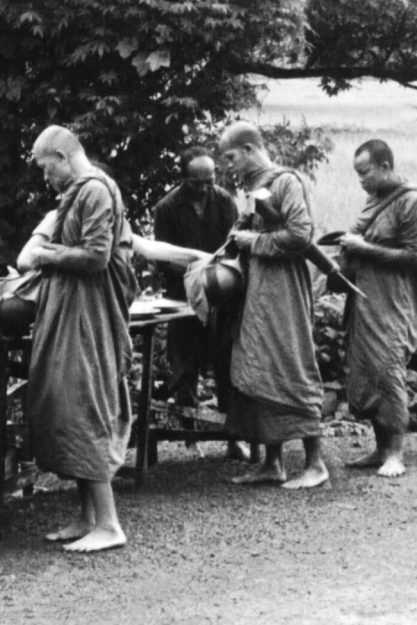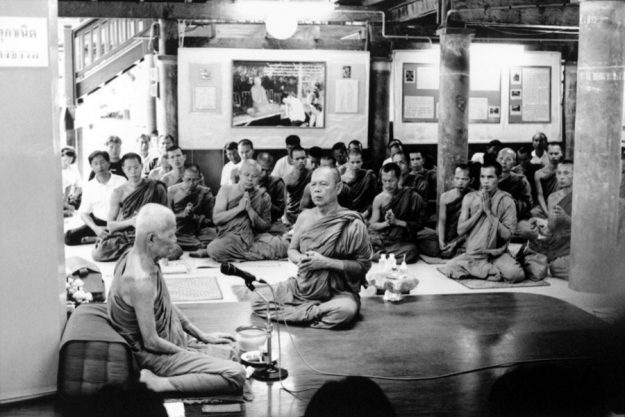I arrived at Wat Pa Baan Taad in April. In June, [Ajahn Luangta Maha Bua] considered whom he would allow to stay on during the rains retreat. That year, he accepted Phra Sudjai (Ven. Ajahn Sudjai Tantamano), who had been ordained two years before me at Wat Asokaram. I had been ordained for only one year at that point.
Also staying at the monastery then were Ven. Ajahn Boonmee Paripunno and Ven. Ajahn Lee Kusalataro. I was closer to Phra Sudjai because our kutis were next to each other and we sat next to each other at mealtime. Phra Boonmee (Ven. Ajahn Boonmee Dhammarato), who had been staying at Wat Tham Khao Tao, came after me. Although we had observed the same number of rains, because I had been ordained a few months before him, he would sit after me and walk behind me during alms round.

On that day, before Luangta gave the dhamma talk, he chose the monks who would be staying on for the rains retreat. He said, “You may stay,” or “You may not stay,” and when he got to me, he kept his cards close to his chest. Instead, he asked, “You, from Wat Bowon, do you remember we had an agreement on the first day you arrived? Your stay was to be temporary, which meant that you would not be staying on.” He left it at that, so I resigned myself to the fact that I would not stay; I would have to leave, and so be it.
After that, he gave an hour-long dhamma talk. At the end of the meeting, when he got up to pay respect to the Buddha, he said “You, from Wat Bowon, if youʼd like to stay, you certainly may.”
When he approved my stay, the monks who were already staying there permanently came up to congratulate me. That year, Luangta accepted only four monks; the others had to leave. He was very selective, because having too many monks could be problematic in overseeing how they practiced meditation. If the numbers were small, Luangta was able to watch over everyone and recognize them by face. He could take care of them in all ways, and the quality of the monks would be better. Besides, if we got anything easily, we would not see the value in it. Anything that takes us a lot of difficulty to get, we then take care of.

Once Luangta allowed me to remain at Wat Pa Baan Taad, I stayed there for a long time because I had found a good place to meditate. A great bonus was having Luangta as a teacher, who gave us many methods that we could not find in books, or if we did, the explanations were not as detailed as when we applied them in reality.
***
The Vinaya states that, in the first five years after monks have ordained, they have to stay with their teacher. This same regulation was followed at Wat Pa Baan Taad: We could not go anywhere except for unavoidable reasons, such as the death of a parent.
If anyone wanted to travel to this or to that quiet spot, Luangta would not allow it. For example, a monk of two rains would not be able to travel unless Luangta saw that he had the capacity and that the trip would bring benefit. There was a monk who had two or three rains and was pestering Luangta for permission to go wandering on dhutanga (abiding by a specific set of austere practices). Finally, Luangta said, “If you go, donʼt come back.” Luangta considered the practitionerʼs mind as core, and not how many rains he had. Even if a monk had the requisite five rains, if Luangta thought that he wasnʼt ready, Luangta would not let him leave, because the trip would ruin him and he might end up disrobing. Such a monk, kept in the monastery, could at least keep learning from his teacher.
Whoever wants to develop wisdom must then look for suffering.
It was also more peaceful and secluded at the monastery. If oneʼs practice had been well established, then it would not be necessary to go anywhere else. But the mind doesnʼt like to stay at the same place for long, because it becomes bored and wants someplace new. The mind therefore tricks us into thinking going somewhere else will be better. But the truth is that staying with the teacher is best. Staying with Luangta created the feeling of being one of his children. Luangta took care of everything. He made sure that we were comfortable and that we did not have to participate in unnecessary activities.
This is why, when we were first ordained, we needed to stay put, because kilesas tend to want to take us elsewhere. We had to conquer this wanting first, because if it kept dragging us around, there would be no stopping. Thus the Vinaya demands that we stay with the first teacher for five years. All the monks staying with Luangta during my time there knew that once they started their stay, they had to remain for the entire five-year duration. Except for the morning alms round, they were not to go anywhere else, because there were no invitations at that time.

If we could remember that Luangta was our true teacher and that staying with him would be beneficial, we would be able to endure. If he did not want us there, he would probably ask the police to take us away. He always said things to provoke us, to test how much our minds could endure. If we did something incorrectly, he would say whatever he had to say. If he held back, that would be to our detriment. He therefore tested our minds to see if we could take the abrasiveness. So if we reflected on the benefits we were deriving now that we were staying with Luangta, we could endure and become more resilient through his efforts. Without endurance, the spiritual perfections, or parami, cannot be cultivated. Having khanti parami, or patience, is a must, understand? Without it, we will be torn to pieces when we encounter Mara. There has to be Mara to compel us to cultivate our parami for protection; we cultivate khanti so we will not suffer. Wisdom hasnʼt yet arisen, so if we want to be smart, we have to look for suffering. When we face suffering, we will have to find the way to solve it. Only then can wisdom arise.
Wisdom isnʼt something that others can give to us. While they can teach us, it remains words and external knowledge. But when it comes to the crunch, we have to make wisdom arise ourselves. We can take what we have learned as a means to give rise to wisdom, but we have to do the work. If we didnʼt face suffering, we wouldnʼt have to find a solution. Similarly, if we didnʼt have to take an exam, we wouldnʼt study. Only when we have to take an exam, would we have to figure out how best to tackle it. After thinking it through, we can then take the exam. This is wisdom. When suffering arises, we solve it by extinguishing the suffering in our mind. This is wisdom that knows that this particular suffering will not arise again within us. We resolve suffering using wisdom. So whoever wants to develop wisdom must then look for suffering. If they look for happiness, they will only get kilesas: confusion, attachment, and craving for happiness to last. But there isnʼt any happiness that can last; it can change at any time.
♦
This article was excerpted and adapted from Phra Ajahn Suchart Abhijato’s autobiography, Beyond Birth, and was republished with permission from Phra Ajahn Suchart Abhijato at Wat Yannasangwararam.
